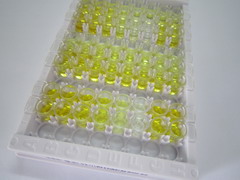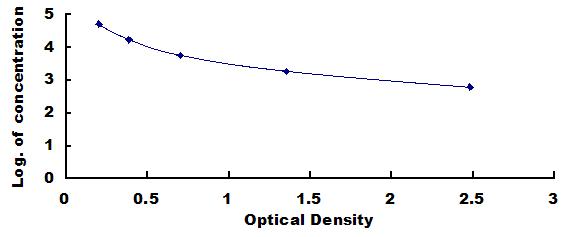Packages (Simulation)

Reagent Preparation

Image (I)
Image (II)
Certificate


ELISA Kit for D-Dimer (D2D)
D 2 Dimer
- Product No.CEA506Eq
- Organism SpeciesEquus caballus; Equine (Horse) Same name, Different species.
- Sample Typeplasma
- Test MethodCompetitive Inhibition
- Assay Length2h
- Detection Range617.3-50,000pg/mL
- SensitivityThe minimum detectable dose of this kit is typically less than 283.1pg/mL.
- DownloadInstruction Manual
- UOM 48T96T 96T*5 96T*10 96T*100
- FOB
US$ 542
US$ 774
US$ 3483
US$ 6579
US$ 54180
For more details, please contact local distributors!
Specificity
This assay has high sensitivity and excellent specificity for detection of D-Dimer (D2D).
No significant cross-reactivity or interference between D-Dimer (D2D) and analogues was observed.
Recovery
Matrices listed below were spiked with certain level of recombinant D-Dimer (D2D) and the recovery rates were calculated by comparing the measured value to the expected amount of D-Dimer (D2D) in samples.
| Matrix | Recovery range (%) | Average(%) |
| sodium citrate plasma(n=5) | 87-102 | 95 |
Precision
Intra-assay Precision (Precision within an assay): 3 samples with low, middle and high level D-Dimer (D2D) were tested 20 times on one plate, respectively.
Inter-assay Precision (Precision between assays): 3 samples with low, middle and high level D-Dimer (D2D) were tested on 3 different plates, 8 replicates in each plate.
CV(%) = SD/meanX100
Intra-Assay: CV<10%
Inter-Assay: CV<12%
Linearity
The linearity of the kit was assayed by testing samples spiked with appropriate concentration of D-Dimer (D2D) and their serial dilutions. The results were demonstrated by the percentage of calculated concentration to the expected.
| Sample | 1:2 | 1:4 | 1:8 | 1:16 |
| sodium citrate plasma(n=5) | 89-98% | 80-94% | 93-101% | 88-102% |
Stability
The stability of kit is determined by the loss rate of activity. The loss rate of this kit is less than 5% within the expiration date under appropriate storage condition.
To minimize extra influence on the performance, operation procedures and lab conditions, especially room temperature, air humidity, incubator temperature should be strictly controlled. It is also strongly suggested that the whole assay is performed by the same operator from the beginning to the end.
Reagents and materials provided
| Reagents | Quantity | Reagents | Quantity |
| Pre-coated, ready to use 96-well strip plate | 1 | Plate sealer for 96 wells | 4 |
| Standard | 2 | Standard Diluent | 1×20mL |
| Detection Reagent A | 1×120µL | Assay Diluent A | 1×12mL |
| Detection Reagent B | 1×120µL | Assay Diluent B | 1×12mL |
| TMB Substrate | 1×9mL | Stop Solution | 1×6mL |
| Wash Buffer (30 × concentrate) | 1×20mL | Instruction manual | 1 |
Assay procedure summary
1. Prepare all reagents, samples and standards;
2. Add 50µL standard or sample to each well.
And then add 50µL prepared Detection Reagent A immediately.
Shake and mix. Incubate 1 hour at 37°C;
3. Aspirate and wash 3 times;
4. Add 100µL prepared Detection Reagent B. Incubate 30 minutes at 37°C;
5. Aspirate and wash 5 times;
6. Add 90µL Substrate Solution. Incubate 10-20 minutes at 37°C;
7. Add 50µL Stop Solution. Read at 450 nm immediately.
GIVEAWAYS
INCREMENT SERVICES
| Magazine | Citations |
| 22 | Determinants of the thrombogenic potential of multiwalled carbon nanotubes ScienceDirect: S0142961211004819 |
| Journal of Thrombosis and Haemostasis | Exogenous Activated Protein C Inhibits the Progression of Diabetic Nephropathy Pubmed: 22236035 |
| PLOS ONE | Protective Effect of Curcumin on Pulmonary and Cardiovascular Effects Induced by Repeated Exposure to Diesel Exhaust Particles in Mice PlosOne: Source |
| Haemetology | Clinical impact of factor V Leiden, prothrombin G20210A, and MTHFR C677T mutations among sickle cell disease patients of Central India Pubmed: 23992124 |
| Journal of Trauma and Acute Care Surgery | Assessment of coagulopathy, endothelial injury, and inflammation after traumatic brain injury and hemorrhage in a porcine model Lww:Source |
| Journal of Thrombosis and Haemostasis | Protein S exacerbates alcoholic hepatitis by stimulating liver natural killer T cells Pubmed:25399514 |
| Inflammation.? | Systemic and Flap Inflammatory Response Associates with Thrombosis in Flap Venous Crisis Pubmed:25448261 |
| Medical Science Monitor | Impact of β-Adrenoceptor Blockade on Systemic Inflammation and Coagulation Disturbances in Rats with Acute Traumatic Coagulopathy Pubmed:25676919 |
| Blood | Intraperitoneal administration of activated protein C prevents postsurgical adhesion band formation. PubMed: 25575539 |
| Am J Physiol Regul Integr Comp Physiol | Procoagulant and Fibrinolytic Activity after Polytrauma in Rat PubMed: 26632604 |
| hypertension Research | Upregulation of canonical transient receptor potential channel in the pulmonary arterial smooth muscle of a chronic thromboembolic pulmonary hypertension rat model PubMed: 26155749 |
| Molecular Nutrition & Food Research | Trans‐fatty acid promotes thrombus formation in mice by aggravating antithrombogenic endothelial functions via Toll‐like receptors PubMed: 25546502 |
| JCI Insight. | KLF2 and KLF4 control endothelial identity and vascular integrity. pubmed:28239661 |
| The American Society of Anesthesiologists | Activated protein C drives the hyperfibrinolysis of acute traumatic coagulopathy pubmed:27841821 |
| 32 | Activated TAFI Promotes the Development of Chronic Thromboembolic Pulmonary Hypertension: A Possible Novel Therapeutic Target pubmed:28289017 |
| The American Journal of Pathology | Inhibition of Cell Apoptosis and Amelioration of Pulmonary Fibrosis by Thrombomodulin pubmed:28739343 |
| Atherosclerosis | Low dose of alcohol attenuates pro-atherosclerotic activity of thrombin. pubmed:28923781 |
| 28 | Lactadherin Promotes Microvesicle Clearance to Prevent Coagulopathy and Improves Survival of Severe TBI Mice pubmed:29162596 |
| Journal of Thrombosis and Thrombolysis | Guided longer pulses from a diagnostic ultrasound and intraclot microbubble enhanced catheter-directed thrombolysis in vivo. pubmed:28417266 |
| Journal of Investigative Surgery | Experimental Evaluation of a New Tissue Factor-Based Topical Hemostat (TT-173) for Treatment of Hepatic Bleeding Pubmed: 30380352 |
| Marine Drugs | The Inhibitory Effect of Protamine on Platelets is Attenuated by Heparin without Inducing Thrombocytopenia in Rodents Pubmed: 31533230 |
| Intensive Care Med Exp | Complement factor D is linked to platelet activation in human and rodent sepsis 34396466 |
| Thromb Res | NLRP3 Inflammasome contributes to endotoxin-induced coagulation Pubmed:35421682 |
| Experimental and Therapeutic Medicine | Construction of a rabbit model with vinorelbine administration via peripherally inserted central catheter and dynamic monitoring of changes in phlebitis and thrombosis Pubmed:35126715 |
| Catalog No. | Related products for research use of Equus caballus; Equine (Horse) Organism species | Applications (RESEARCH USE ONLY!) |
| CEA506Eq | ELISA Kit for D-Dimer (D2D) | Enzyme-linked immunosorbent assay for Antigen Detection. |
| LMA506Eq | Multiplex Assay Kit for D-Dimer (D2D) ,etc. by FLIA (Flow Luminescence Immunoassay) | FLIA Kit for Antigen Detection. |









